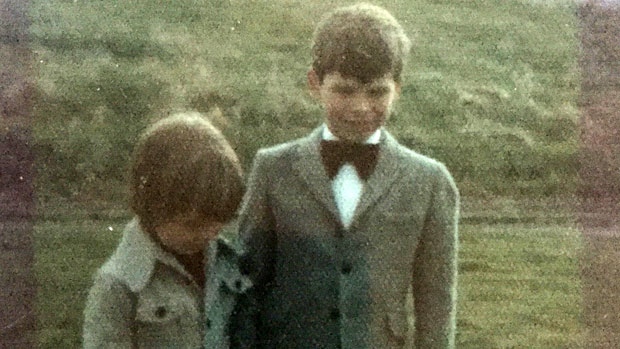Jan 24, 2017
I talk for my brother Bryce
TSN Reporter Paul Hollingsworth lost his brother Bryce to suicide 26 years ago. Today, Paul dedicates much of his time reaching out to others and talking about mental health - what Bell Let's Talk is all about.

The older I get, the more difficult it becomes to recall some of the things that happened just days, sometimes hours, before. But memories from my childhood remain crystal clear.
I have so many memories of my older brother Bryce.
I recall fondly my first day of school in 1975. He held my hand as we crossed Chebucto Road in Halifax as I began grade primary.
When I was six he tied my skates at the Nova Scotia Voyageurs Christmas party at the Halifax Forum.
I especially remember the time I encountered a neighbourhood bully. Bryce knew I was terrified and said, “I’ll take care of it.” He did and the bully never bothered me again.
He taught me how to score baseball games and brought me into a world that included his love and passion for Major League Baseball. He loved the sport, and in time I loved it, too. It was our thing.
I could go on. We had 21 Christmases together, brother-on-brother bedroom spats, wrestling matches, long games of catch until our arms ached, Saturday morning cartoons and family vacations. I remember so many things. In my quiet moments I often find myself chuckling and rolling my eyes. Good times, good recollections.
Those memories formed me.
And so did this: My brother had a secret. In the 1980s and early 90s it was a dark secret, the kind of thing one never ever talked about openly. Bryce suffered from mental illness. He was clearly wracked with depression and, from my readings over the years, I would wager a guess that he was also stricken with a form of mania.
Sadly, I also have many memories on this subject. I’ve tried to suppress them, force them from my mind and pray for them to go away. But they won’t.
I should have talked to him when I was 21.
I didn’t.
Now I’m 47 and I sometimes find myself sharing these stories while talking with others, sometimes daily.
For example: One hot summer Nova Scotia day when I was about to go to the beach, I found him in the basement, sitting alone in the dark with the curtains closed. Seven hours later when I returned home he was still there, in the dark, alone.
Also, in time, I came to learn that he was abusing drugs and alcohol and began making terrible decisions with his life – spiraling out of control. He was doing most of this by himself, alone most of the time.
Did I talk to him? Did I offer any help? No. He suffered in silence. At the time I recognized what was happening to him, yet I did nothing to help him. No words, no actions, just unenlightened denial on my part. He’ll shake out of it, I told myself on many occasions.
He didn’t shake out of anything.
In December of 1991 he killed himself. This tall, handsome and bright young man was gone, wiped from the face of the earth. On the previous Thursday we had spoken on the phone and by Monday morning it fell on me to go the city morgue to identify him. Several days later we buried him. For the past 25 years a big piece of Bryce has been buried in my heart.
What a tragic, senseless waste.
Life has a way of teaching us about, love, friendship, family, death and loss. I’m haunted by that horrible day 25 years ago. He would have been 50 years old last September had he lived. He didn’t live long enough to have grey hair, get married and start his own family. He never had a career and never really enjoyed any measure of professional success. He never met my wife or my children. I know he would have loved my work with TSN. He missed all of it.
In time my experiences with my brother served to be a slow-motion, real-life TSN Turning Point. It didn’t happen overnight, but it happened. I became more socially aware, more sensitive and perhaps more caring. While I still strive to be a better parent, I’m certain that my ability to open my heart to my children is connected to the loss my family endured when my brother took his life. How could it not be?
Over the years I’ve had people tell me that I have experience with mental illness and suicide. I don’t. I’ve never suffered from the same issues that made wreckage of my brother’s life. But I do have experience when it comes to mental illness having an impact on a family.
Here’s what I know: Words matter. Talking helps. Today is Bell Let’s Talk Day in Canada. It’s a call to action for a cause that can change the world and save lives.
Take it from me. Talking to the ones you love and the ones who need help is crucial. It’s can be a difference maker.
I know. I should have talked to Bryce in 1991 but I didn’t.
Now I can’t stop talking.
According to the Canadian Mental Health Association, mental illness impacts all Canadians at some point, either directly, through a family member, friend or co-worker. Twenty per cent of Canadians will personally experience a mental illness in their lifetime.
These numbers are both staggering and crushing. There’s work we all can do.
Bell Let’s Talk is a wonderful initiative. I believe it saves lives due to a very simple and basic truth. We now know what I didn’t in 1991. Talking is the best way to start breaking down the barriers and stigma associated with mental illness.
If I had a time machine I would go back and help my older brother Bryce. I would talk to him and help him get him the assistance he so desperately needed. If I could do that I could change my family history and save a life. I can’t, I know that. But 25 years later I’ll do whatever I can to make sure I spread this crucial message.
Open your hearts and talk. We owe it to each other.
And I owe it to my brother.
Paul Hollingsworth is the Atlantic Canada Bureau Reporter for SportsCentre.


